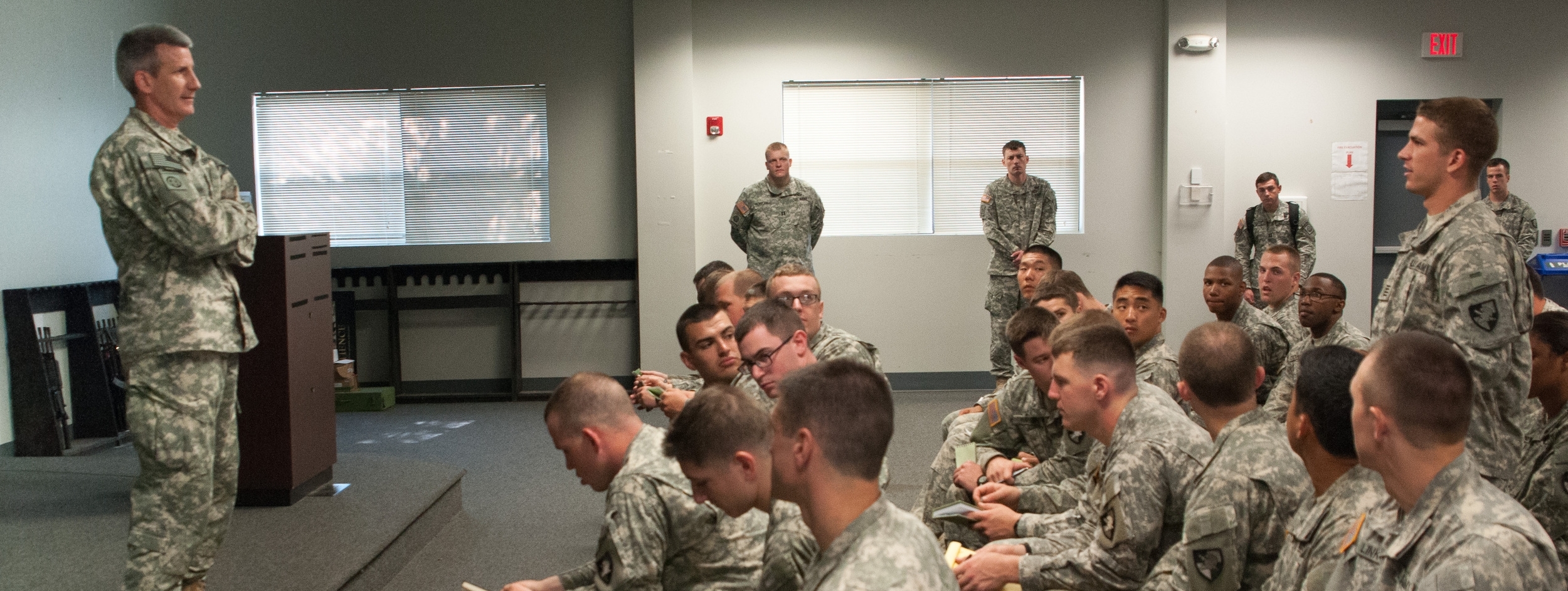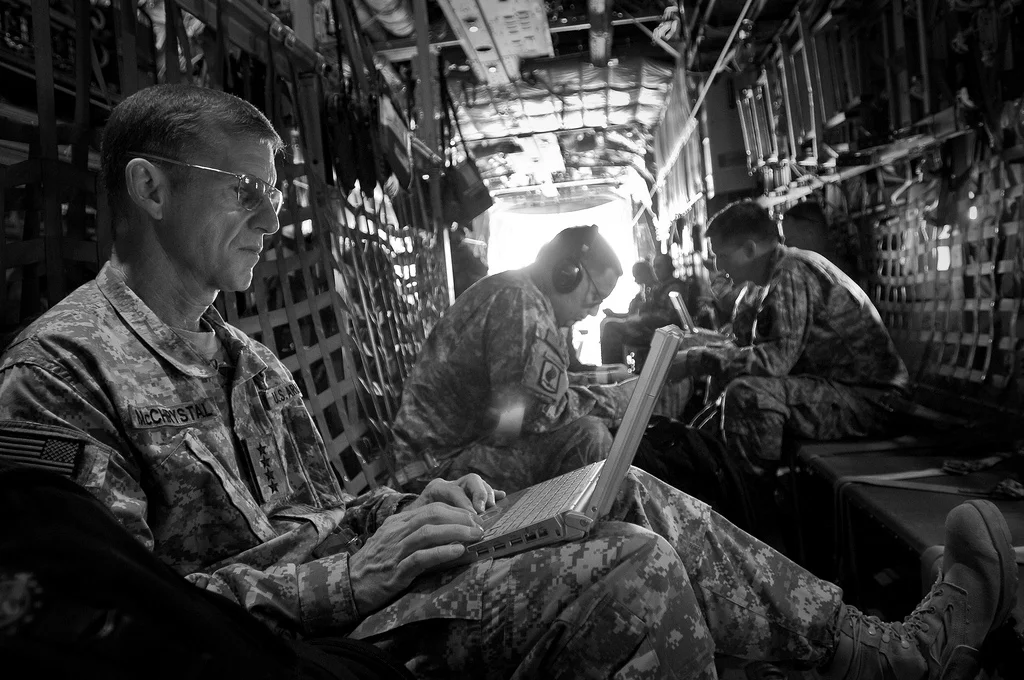Leadership has close cousins in management and supervision and at different times includes activities as diverse as communication, motivation, coaching, discipline and planning, to name but a small sample. A leader the is calm voice giving commands on a chaotic bridge, a general devising a brilliant invasion plan, a field grade officer making sure his soldiers are properly prepared for an upcoming deployment, a program manager helping to sharpen the thinking of a design engineer, or a Service Secretary persuading Congress and the public on the value of his service’s capability to the nation. Perhaps the only thing one can say about good leadership that applies universally is that to be effective, it must be tailored to fit.
Reflections on #Leadership: Asking the Right Questions
Since the Army Operating Concept: Win in a Complex World was published in 2014, military leaders have been inundated with the idea of complexity. But how should we prepare to overcome complexity? How can leaders improve their ability to understand, visualize, and describe this environment to enable decision making? How should we adjust our planning to account for this complexity? In the past, the military has largely focused on new or improved processes and technology to account for historic lessons learned, but will this be successful in the future? There are many ways to prepare for a complex world, but improving cognition through inquisitiveness should be chief among them.
Reflections on Persuasive #Leadership: Leading When You're Not In Charge
The ability to persuade others is paramount to success at every level. Effective persuasive leadership can turn ideas into approved contingency plans, doctrine, concepts, or programs of record. Convincing others of the importance of a project or plan to gain their support and effort can be the difference between success and failure.
Reflections on #Leadership: Miyagi and Millennials
In the original Karate Kid film, the “kid,” Daniel LaRusso, learns martial arts from one of the most memorable characters in film, Mr. Miyagi. The diminutive sensei’s non-traditional teaching methods complement his quiet, unassuming, and non-confrontational style. As Miyagi steadfastly persists with unusual and demanding training methods, he is clearly emotionally invested in his young pupil. Miyagi listens to Daniel’s concerns as he adjusts and grows as a result of their relationship.
Reflections on #Leadership: Leaving Your Ego at the Door
Egos bent on personal advancement, personal glory, and individual betterment are not what we need as we delve deeper into the growing complexities of the 21st century. Take some time to do a self-assessment and decide what lies in your ego. Can you leave it behind as a leader? It is something we all need to train for, and most importantly, something our troopers and nation deserve.
#Reflections on Leadership: Uncertainty & Tomorrow’s Military Leader
The United States military faces uncertainty on several fronts in the upcoming years. How deep will we get into Syria? Will deployments to Iraq surge to former levels? Will the U.S. ever complete the mission in Afghanistan? In what ways will Russian aggression and Chinese expansionism shape training? How significant a role will cyber warfare play in future conflicts? American military leaders, especially junior leaders, must be prepared to confront these uncertainties; to do so, below are three broad areas critical to military leadership of the future.
Reflections on Mentoring and #Leadership
The U.S. Armed Forces are in for lean times ahead. Budget cuts, continuing operational demands, and ongoing attempts to re-learn the core competencies of conventional warfare will all come together to make resources scarce. Unit-level leader development efforts will have to function with minimal outside resources and assistance; even the minimal assistance higher echelons provided in the past is likely to look luxurious by comparison. At the same time, we should view this period as an opportunity to re-embrace some skills we’ve allowed to atrophy - or at least lay fallow - over the last decade of intense operational activity. The deliberate practice of professional mentoring is one of these skills that, if thoughtfully applied, can pay great dividends for military leaders in the immediate future.
Mission Command #Leadership and the U.S. Army
Mission command is more than a philosophy of command. It represents a culture where mutual trust and the concomitant willingness to accept prudent risk govern. It comes with an expectation that commanders respect their subordinates’ judgment and issue orders that focus on intent rather than tasks. Mission command relies on a shared understanding (of the environment and expectations) that enables every member of the team to exercise disciplined initiative. When done well, mission command is the result of effective leadership.
Learning Experiences in #Leadership: Ten Lessons from the Circle of Trust
For us, it was what we like to call a “learning experience” in the military. It was an opportunity to expand our leadership “skill set,” to learn from a mistake, and even better that we could learn from someone else’s mistake rather than one of our own making. Over the course of that assignment, there were a lot more similar experiences. Some seemed relatively obvious while others more subtle. Some were generally painless and some clearly “left a mark.” But all of them proved essential as we moved on to other assignments; we were far better leaders as a result.
The Silver Bullet of #Leadership
The demands on the military leaders of the future will change. However, effective leadership empowered by social intelligence allows our men and women to lead and inspire their followers today and in the future. Leaders that care enable our collective success through their social intellect. Caring is the silver bullet of leadership; everything else is technique.
#Leadership and the Art of Restraint
Major General Cantwell’s words articulate the frustration of having to justify actions at the tactical level to those far removed from the area of operations. There are certainly important reasons for having to do this, such as the need to update higher levels of command with the progress of operations, and to explain why certain incidents have occurred. Indeed, accountability for decisions made and actions taken is an enduring feature of civil-military relations in democratic nations.
On Joint #Leadership: The Importance of Communication
Leadership is demanding, and effective communication is critical for any military leader. Clear writing and speaking helps them to build and maintain personal relationships. It enables them to run effective organizations, whether in combat or on staff. It allows them to connect task with purpose to turn organizations into teams, whether squadrons, battalions, platoons, or military staffs. In a joint environment at the highest levels of government, crisp communication is necessary to present best military advice to civilian leadership.
#Leadership: What did you see?
When describing the fundamental rules of leadership, the phrase "see-think-do" is an especially useful framework; these words summarize the basic technique for assessing student performance among student pilots. The best way to determine where a student’s problem began is by asking a series of questions—What did you see? What did you think? What did you do? Once you know these answers, you are able to offer specific techniques to fix the exact mistake that created the student’s problem. As a result, your instruction is more effective because you quickly get to the point and fix the root cause of the problem.
#Leadership in an Ambiguous World
The nature of serving as a military leader lends itself to an innate desire to be in control of one’s circumstances whenever possible. That said, the future is not, and likely will not be so clear, and future leaders must be prepared to succeed in this environment. By embracing a new standard in training, and more importantly education and development, we can capitalize on the ability of innovative leaders to link new explanations to old problems.
The Strategic Development of Tactical #Leadership
Continued service brings with it the obligation to prepare for increased responsibility. The program of professional military education accounts for some of this development, but leaders cannot hope for future success without mentorship and dedicated self-development. Leaders must take charge of this process, but not at the cost of their unit’s readiness. Instead, they would be wise to heed the advice of a senior officer who said, "Lead at your level, think at your boss’s level, and accept that you’ll just have to adapt to everything beyond that."
Accruing Tacit Knowledge: A Case for Self-Study on behalf of Professional #Leadership
Developing leaders is one the most important endeavors within the military profession. More specifically, establishing the core of “expert knowledge” essential to winning wars defines the profession. In spite of senior leader emphasis to commit to self-development, one of the paths critical to accruing tacit knowledge, many leaders fail to adequately commit themselves to goal-oriented self-study. Considering this important context, while today’s leaders arguably constitute the most “combat-experienced force” fielded in recent memory, much of this experience reflects over a decade principally focused on counterinsurgency that may be only partially relevant for other strategic challenges.
#Leadership: A Bedrock of Trust
Leadership must be built upon a bedrock of trust. This need is obvious in combat, when soldiers must trust their officers to make sound judgment and not to risk the lives and safety of their men needlessly or carelessly. In turn, officers must trust their soldiers to do their duty, and to strive to fulfill not only the specific order given, but the spirit of what the mission is trying to accomplish.
Tactics: Mandatory Imagination in #Leadership
War is both a science and an art. Therefore, it requires certain qualities that, prima facie, are not those of the military leader. Among them is imagination, a creative capacity that offers the opportunity to represent objects that are not perceived or to make new combinations of images.
Set in complex environments and subject to severe budgetary constraints, military operations – today more than ever – require us to shape innovative solutions. Accordingly, using imagination in military tactics should no longer be restricted to a few genius leaders, but institutionalized among the army.
This requires every leader to intellectually work on oneself but overall to be able to promote an organizational culture that allows this skill to develop.
#Leadership Through Example
Battalion and squadron commanders have a profound influence across our military. In the late 1990s, before assuming command of a squadron, I sought advice from then-Colonel Don Holder. The “free, non-binding advice” he sent me proved invaluable. Since that time I learned more about command at the battalion level by observing effective commanders in combat and in training. What follows, printed with his permission, is a revised version of what now Lieutenant General, retired Holder sent me.
#Leadership: The Death of Command and Control
The phrase “command and control” must be dropped from the leader’s lexicon. Words have history and power. The former command and control structures focused information and decision making onto one supposed superman in a rigid hierarchy and expected him to make infallible decisions with omniscient knowledge. These structures are being defeated, bankrupted, and destroyed as we speak. Even when we remove the history of the words, there is power in them and in their implicit directive to centralize information and control. But the defeat of these systems in modern wars does not support the command and control structure. We should replace the phrase with something that reflects a greater understanding of the relationship between leaders and their organization; let’s call this idea of building effective, resilient, winning organizations…leadership.





















